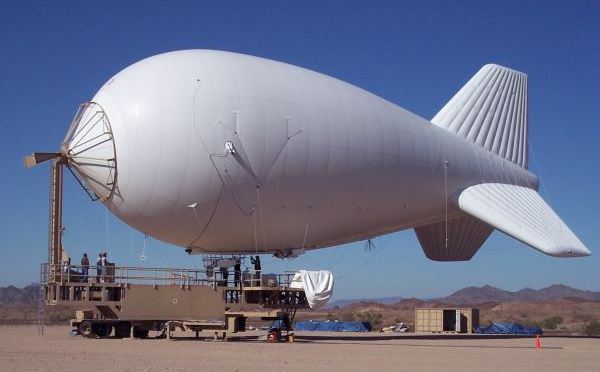The Pentagon is testing large, unmanned blimps in order to “provide a persistent surveillance system to locate and deter narcotic trafficking and homeland security threats ” on US soil, according to a recent “experimental temporary authorization” published by the FCC. The solar-powered balloons are similar to a prototype craft that crashed in Pennsylvania in 2015, after escaping the Aberdeen Proving Ground, a military installation in Maryland, and would provide the government with perpetually powered, high-definition coverage of large geographic areas. Even more invasive, perhaps, than spy satellites.
“Up to 25 unmanned solar-powered balloons are being launched from rural South Dakota and drifting 250 miles through an area spanning portions of Minnesota, Iowa, Wisconsin and Missouri, before concluding in central Illinois.” writes The Guardian. “The balloons are carrying hi-tech radars designed to simultaneously track many individual vehicles day or night, through any kind of weather. The tests, which have not previously been reported, received an FCC license to operate from mid-July until September, following similar flights licensed last year.”
The US has a touchy relationship with mass surveillance, despite it largely having become the norm in the rest of the world. This isn’t surprising to Americans, who have largely opposed domestic surveillance and spying, even in the immediate aftermath of 9/11, which saw the bipartisan passing of the 2001 Patriot Act, a bill that greatly expanded the powers of law enforcement agencies in investigating domestic terrorism under US President George W. Bush. The bill received public criticism for also compromising the security and privacy of innocent Americans. Components of the bill were granted a four year extension in 2011 by US President Barack Obama.
In 2004, then-FBI Director Robert S. Mueller, III defended the controversial act, stating “the Patriot Act has proved extraordinarily beneficial in the war on terrorism and has changed the way the FBI does business. Many of our counterterrorism (sic) successes, in fact, are the direct results of provisions included in the Act…”
17 years later, American citizens’ fears about the Patriot Act, and further mass surveillance, have largely been realized. In 2013, ex-CIA systems administrator Edward Snowden, leaked a substantial amount of data on secret, government spy programs that he felt the American public deserved to know. This includes previously unknown capabilities like the “bulk collection of phone and internet metadata from U.S. users, spying on the personal communications of foreign leaders including U.S. allies, and the NSA’s ability to tap undersea fiber optic cables and siphon off data.” As well as “releasing computer viruses, spying on journalists and diplomats, jamming phones and computers, and using sex to lure targets into ‘honey traps.'”
These balloons are the latest in the continuing trend of growing mass surveillance in the US. Ex-Secretary of Defense Ashton Carter describes use of similar devices in the Middle East nearly ten years ago: “You can spot someone burying an IED or setting up a checkpoint on a road near you; you can catch someone about to mortar your base; you (can) check whether the market is open in a nearby village.”
In the present day, more advanced models will be tested and utilized on US soil to, officially, better track and prevent drug trafficking shipments from entering the US. Naturally, citizens worry about what else they’ll be used for. In the past, new and invasive surveillance technologies have been abused, and some worry this latest development will be no different.
“We do not think that American cities should be subject to wide-area surveillance in which every vehicle could be tracked wherever they go,” said Jay Stanley, a senior policy analyst at the American Civil Liberties Union.
“Even in tests, they’re still collecting a lot of data on Americans: who’s driving to the union house, the church, the mosque, the Alzheimer’s clinic,” he said. “We should not go down the road of allowing this to be used in the United States and it’s disturbing to hear that these tests are being carried out, by the military no less. …if they decide that it’s usable domestically, there’s going to be enormous pressure to deploy it.”
Mark Harris, The Guardian
While public opinion of the practice is low in the US, the facts remain contentious. Some say surveillance makes us less safe and opens citizens up to dangerously dystopian realities already in effect in other parts of the world. But the technology has proven useful at times. The UK utilized its massive CCTV network to track Russian operatives who entered the country and poisoned a former Russian military operative with a deadly nerve agent, from the moment they stepped out of the airport. The attempted assassination had unintended casualties and has furthered Western tensions with Russia.
Despite public uneasiness, testing of the new surveillance balloons is predicted to move forward unimpeded.

